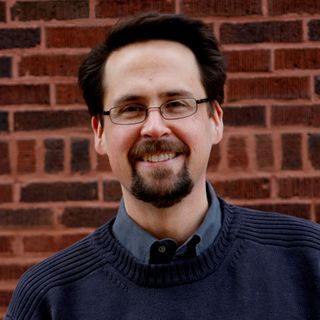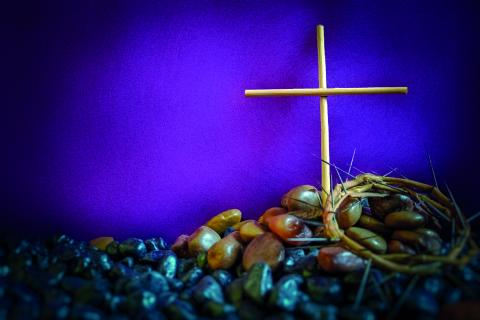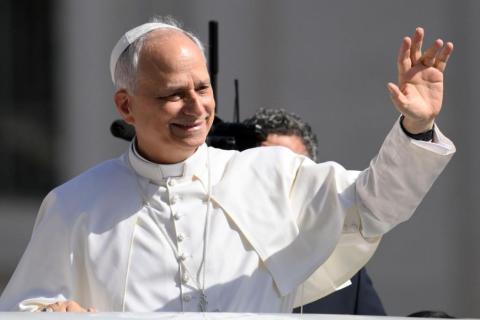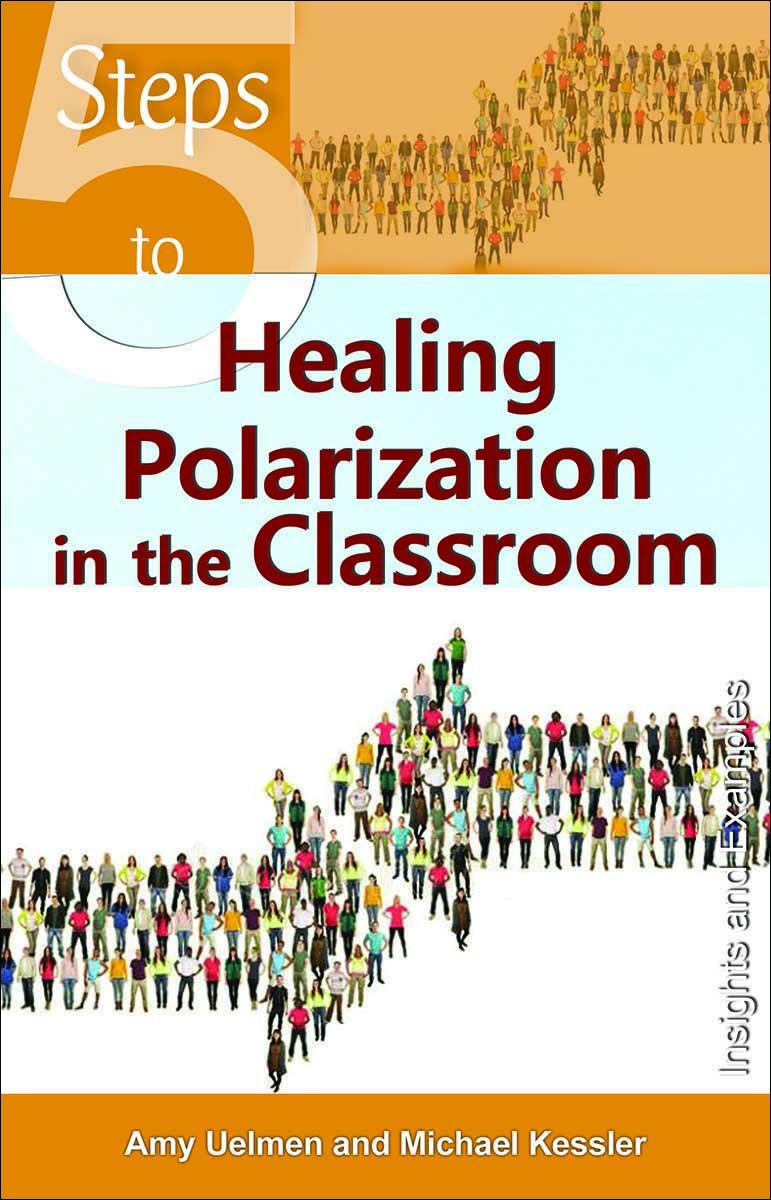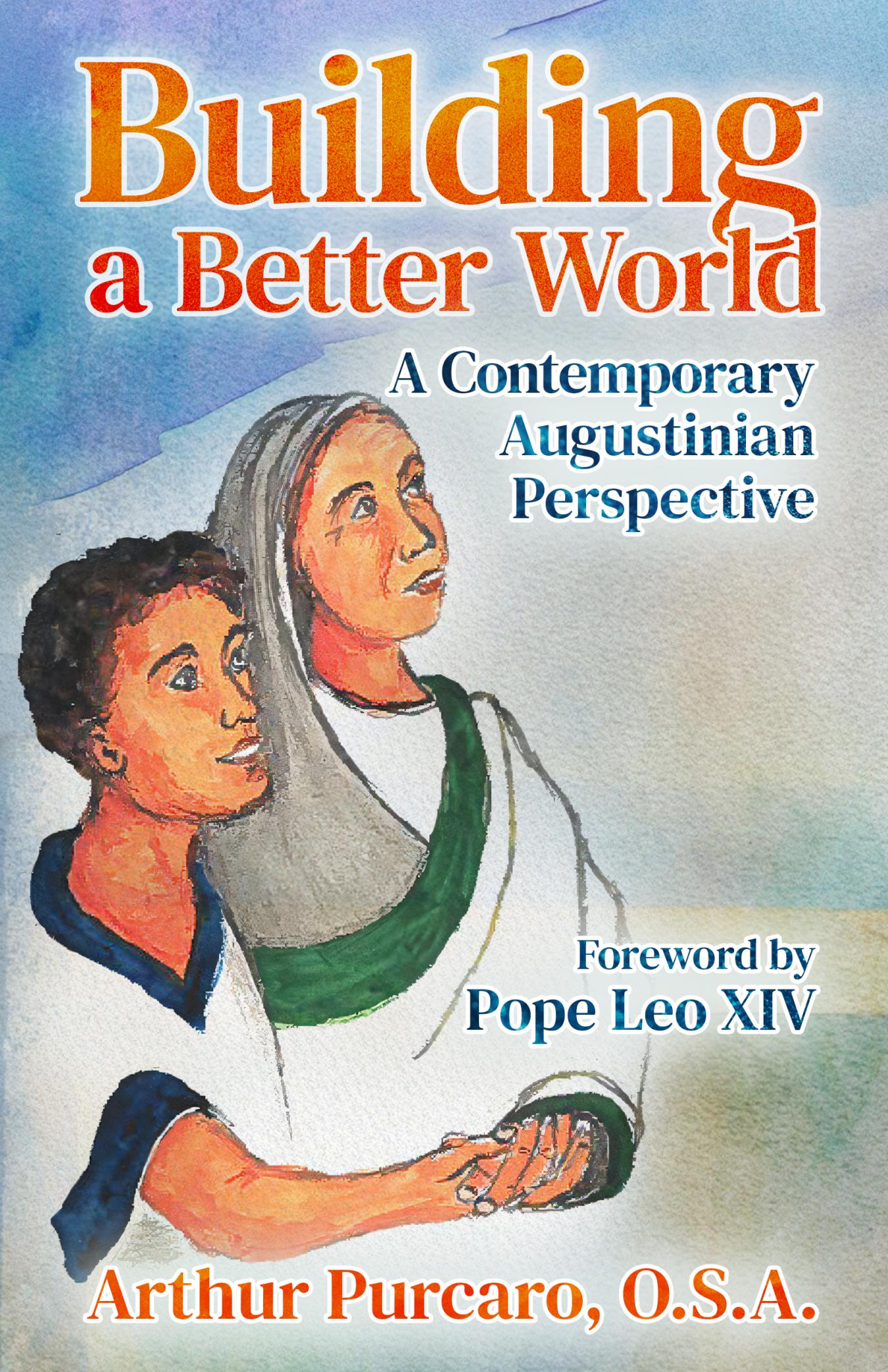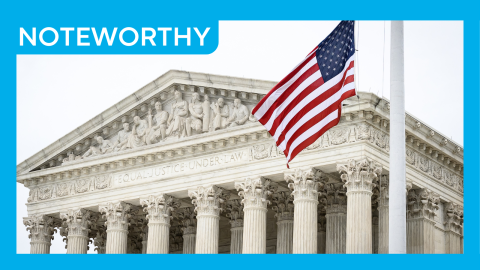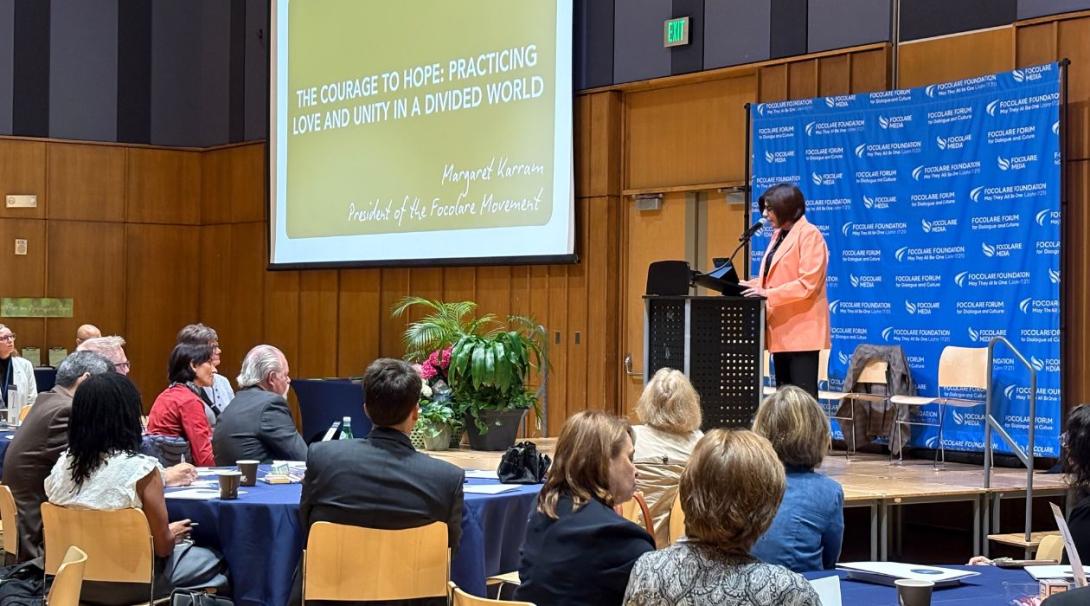
Kim Rowley - CSCAudiovisivi
Focolare Media participated last week in the “Sustainable Peace Networks: Multi-View and Multi-Faith Forum” in Silver Spring, Maryland. Organized by the Focolare Forum for Dialogue and Culture in collaboration with key partners, the event brought together leaders from diverse churches, religions, and cultural backgrounds to foster concrete strategies for building sustainable peace in conflict zones.
The 120 participants ranged from grassroots activists to institutional leaders and represented about 90 organizations. They shared stories, challenges, and approaches grounded in their spiritual and professional experiences. We knew that Margaret Karram, president of the Focolare Movement would be there, and she gave a powerful opening talk that included these words:
Believing in unity—as the destiny of the human family, in the spirit of Jesus’ prayer, “That they may all be one” (John 17:21)—means dismantling the idea of the enemy. It means recognizing in every person a potential partner in communion and solidarity.
In today’s world, this might sound abstract—or even naive. But for me as a Christian, unity becomes real through small, but courageous acts of love.In 1990, I was living in Jerusalem as part of the Focolare community. The city was tense. The Second Intifada had begun, and the Gulf War had just broken out, and you could breathe fear everywhere: fear of missiles or of suicide bombers who could be anywhere, even next to you on the bus. One morning, I was driving to work with a friend when I saw a woman running toward the bus stop. She had just missed her bus and looked distressed. Something in me wanted to help, though I hesitated for a moment—we didn’t know her. But the desire to reach out was stronger. I offered her a ride to the city center. During that short journey, we talked and discovered a surprising connection. She was deeply moved that we—Christians, and I, an Arab—had helped her, a Jewish woman.
That evening, she came to thank us again and invited us to meet her family. A beautiful friendship was born—one that lasted through many life events: holidays, weddings, religious celebrations. She wanted to learn more about Christianity, and we explored the richness of Judaism. That friendship introduced me to many others. It brought healing to old wounds and deepened my understanding of what it means to live unity in a divided city. And it all began not with a grand political gesture, but with something small: the gesture of offering a ride.
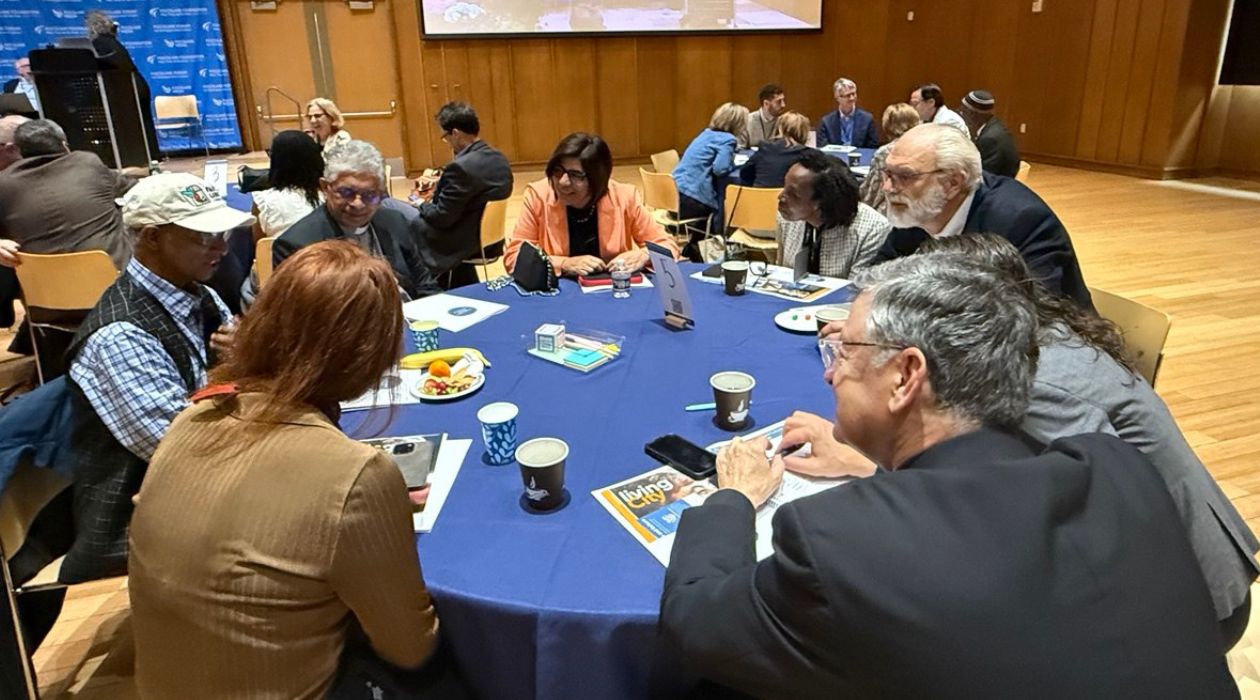
Kim Rowley - CSCAudiovisivi
There were many other talks and conversations, as well.
Amy Uelman, well-known to our readers, led a conversation in the wake of the October 7 attacks and the escalating conflict in Israel and Palestine, from her firsthand knowledge of how tensions on college campuses still run high. Amy is at Georgetown, where she and her colleagues have supported student faith leaders through the Interfaith Advisory Council (IAC). By ensuring it was an incubator for courageous dialogue and mutual care, the IAC not only endured the crisis but became a space where students could recognize each other’s pain, build trust, and model solidarity across deep divides. The conversation at Amy’s table centered around what solidarity looks like when our community feels (or when we personally feel) vulnerable, unheard, or misrepresented.
Another participant, Tiffany Goodwin Van-Camp, the executive director of American Friends of Combatants for Peace, also addressed the war in Gaza by mentioning a letter-writing campaign they’re organizing beginning this week. “Letters for Gaza” is a U.S. coalition-led campaign mobilizing citizens nationwide to urge members of Congress to support full, unrestricted humanitarian access to Gaza and an immediate halt to the bombardment of civilians (to join this effort, start here).
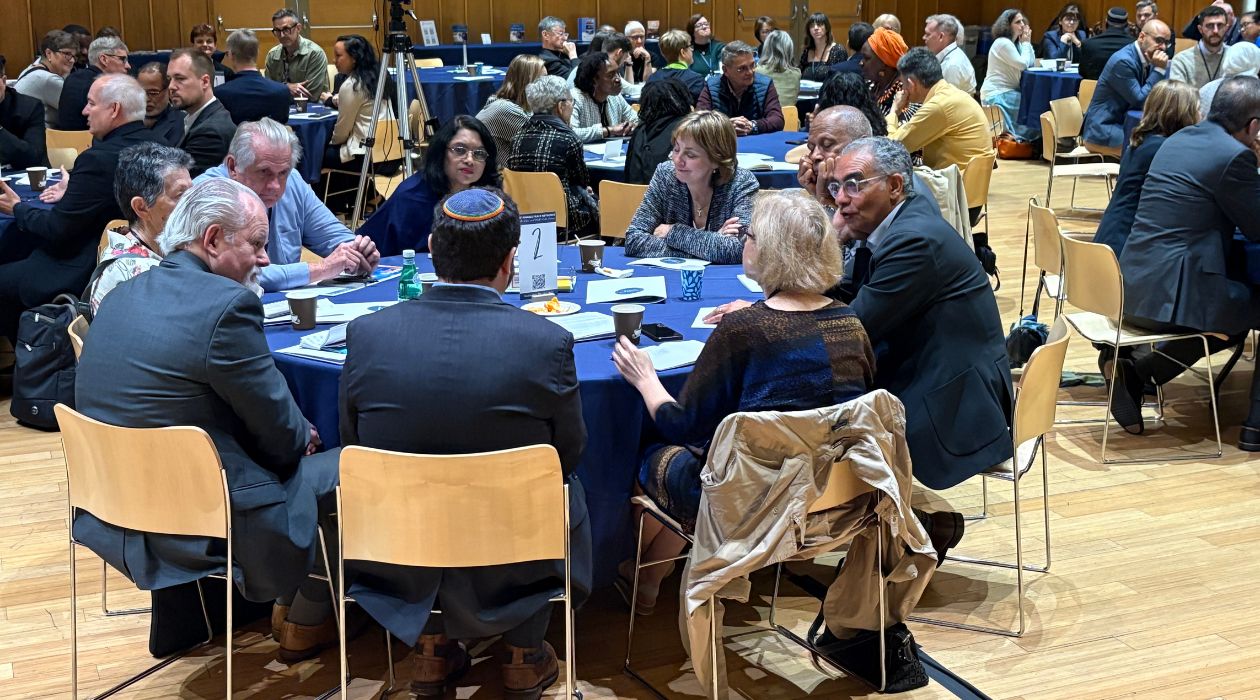
Kim Rowley - CSCAudiovisivi
In another table conversation, Giovanna Czander and Sasha Ongtengco—both longtime members of the Focolare Movement and active in dialogue initiatives—shared the story of a deepening exchange between Focolare communities in the U.S. and Ukraine. They presented powerful testimonies from Ukrainian friends who continue to live and build community amid the ongoing war. This dialogue reflected a shared desire for reciprocity—not only to be heard, but also to listen and understand how others are living this time of global uncertainty.
These are only two of the many dialogues that took place around the many tables.
There were also new methods attempted for building relationships and sparking ideas around peace and unity. For example, “PodCafé” was a session inspired by the World Café and Human Library models. It was used as a space for real dialogue, not just downloads. It felt like a podcast brought to life: small circles of people, swapping stories, sharing insights, and listening deeply.
We finished our 24 hours together with a closing challenge: to commit to creating a “Peace Protocol” that could serve as a shared framework for organizations and individuals working toward peace and unity around the world. The idea resonated with many of us. We agreed to take the first steps toward developing such an initiative in no less than 60 days.
James Walters (NGO Representative at the United Nations for Sisters of Charity Federation) reflected: “It was so wonderful to meet many of you. I arrived quite heavy from the division of our world, and although the heaviness remains, I now have a greater sense of solidarity and hope.”
Chandra DeNap Whestine (COO at One America Movement) wrote: “I have met people from all over the world who are committed to building peace in some of the most difficult contexts, and the lesson I have heard again and again is that healing begins with small but courageous acts of love.”
Stay tuned.


